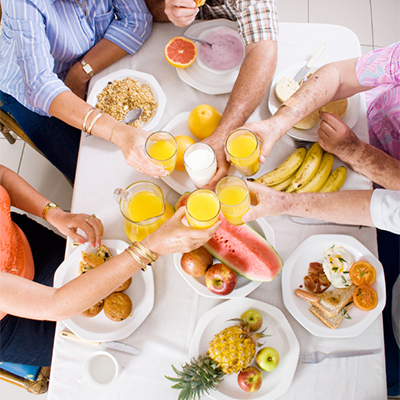
In general, balanced nutrition is important for us all, but there are factors which make it even more important for elderly people and for those who care for them. Our nutrition depends also on sufficient fluids, so it is recommended that people drink the equivalent of 6 -8 glasses of water per day. Older people may cut down on this for various reasons, such as being less sensitive to our thirst as we age, or through fear of incontinence. But insufficient fluids can lead to confusion, dizziness and other medical conditions which will progressively affect our overall health.
Similarly for food in general: older people may be less mobile and less aware of their sense of hunger. This can lead to avoiding or minimising our food intake, again with serious ongoing health problems. Not having sufficient food or fluid intake can lead to restricted mobility, lack of energy, depression and increasing frailty. It is too easy to ascribe these to the onset of ageing itself, and it is important to be aware of this mistake.
A solution to these issues of under-eating or drinking can be to make eating an enjoyable social occasion, as in a social care setting. Where people enjoy their food with good conversation, humour and sharing views and opinions, eating well will come naturally. On the other hand, the person who eats alone may well forego main meals, taking snacks, or simply often missing out on what they need to eat and drink.
So it is important that people providing care encourage social dining, and ensure that the environment is quiet, comfortable and conducive to interaction and conversation. It is important too to realise that we are less active as we age, and our body composition can change. This will mean that we need less food, and we should recognise this as we provide choice in meals and portion size.
When I managed care homes, I often found that older people mentioned that their meals served were too large. This often led to unhappiness for them at the table, and missing out on some of the balanced meal which was provided. We found a solution which worked for most people, which was to allow people to help themselves to as small or large portion as they wished. We did this through using serving dishes on the table, providing support for people to help themselves where needed.
Calcium, fibre and a healthy range of protein and vegetables are all essential aspects of good nutrition. While a trained cook will take account of these in the special needs of the elderly, it is also important to balance food intake with mobility and activities. There is an obvious risk of becoming overweight if energy intake is not set against output in terms of daily activity. It is therefore an important aspect of giving care to ensure that people find and pursue activities that they enjoy and are meaningful to them.
There are many sources of advice and support in nutrition for older people. Care UK have published a booklet giving very good general advice, with a range of other resources in the appendix. NHS Choices and the Caroline Walker Trust I have found to be helpful sources of advice on this subject which is important to us all.



